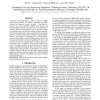Free Online Productivity Tools
i2Speak
i2Symbol
i2OCR
iTex2Img
iWeb2Print
iWeb2Shot
i2Type
iPdf2Split
iPdf2Merge
i2Bopomofo
i2Arabic
i2Style
i2Image
i2PDF
iLatex2Rtf
Sci2ools
INTERSPEECH
2010
2010
Context adaptive training with factorized decision trees for HMM-based speech synthesis
To achieve natural high quality synthesised speech in HMMbased speech synthesis, the effective modelling of complex acoustic and linguistic contexts is critical. Traditional approaches use context-dependent HMMs with decision tree based parameter clustering to model the full combination of contexts. However, weak contexts, such as word-level emphasis in neutral speech, are difficult to capture using this approach. To effectively model weak contexts and reduce the data sparsity problem, weak and normal contexts should be treated independently. Context adaptive training provides a structured framework for this whereby standard HMMs represent normal contexts and linear transforms represent additional effects of weak contexts. In contrast to speaker adaptive training, separate decision trees have to be built for the weak and normal context factors. This paper describes the general framework of context adaptive training and investigates three concrete forms: MLLR, CMLLR and CAT based syste...
| Added | 18 May 2011 |
| Updated | 18 May 2011 |
| Type | Journal |
| Year | 2010 |
| Where | INTERSPEECH |
| Authors | Kai Yu, Heiga Zen, François Mairesse, Steve Young |
Comments (0)

